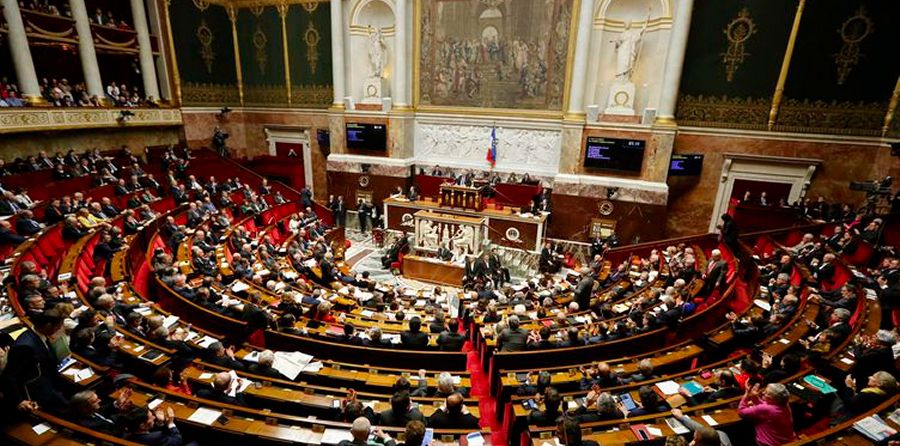LEGISLATIVE THREE UNEQUAL STRATEGIES
FOR AN UNCERTAIN RESULT | |
The question of temporality A few minutes after the election of Emmanuel Macron, Jean-Luc Mélenchon launched the legislative battle by insisting on the idea that these constituted the 3ᵉ round of the presidential election. He thus posed as the first opponent, without giving Emmanuel Macron and Marine Le Pen time to rejoice or digest their results of the second round of the presidential election. The weeks following Emmanuel Macron's election were dominated, in the media and in public opinion, by negotiations between left-wing parties and the establishment of the New Popular Economic and Social Union (Nupes ) while the National Rally rejected the advances of Reconquest! and that Marine Le Pen decided to go on vacation. Emmanuel Macron seemed to openly agree to let go, arguing that there was a need for post-presidential election democratic breathing. The idea was probably also to miss the media enthusiasm caused by this new union of the left. And to regain the initiative when appointing his or her Prime Minister when the time between the presidential election and the legislative elections is this year two weeks longer and a re-election generally provokes less enthusiasm than a first accession to power. Very different positions Emmanuel Macron's re-election as president has, by his own admission, positioned him as the president of all French people and inevitably limited his role and action as a clan leader. While Jean-Luc Mélenchon's speech on the evening of the first round of the presidential election seemed to mark the announcement of a handover and a withdrawal, on the contrary we are witnessing a strategy of strong emphasis of the leader of La France Insoumise (LFI). If this has prevented certain left-wing personalities from joining this union movement (Carole Delgas, José Bové, Yannick Jadot, etc.), this personalization undoubtedly aims to mobilize, during the legislative elections, voters who are above all seduced by the personality and the leadership of the rebellious chief during the presidential election. By claiming the post of Prime Minister if the Nupes were to obtain a majority in the legislative elections, Jean-Luc Mélenchon positioned himself at the national level. From this point of view, his decision, criticized by his adversaries, not to stand again in the legislative elections finally allowed him to assume a position above the parties, which a local field campaign would undoubtedly have made more complicated. . By running in the legislative elections, Marine Le Pen has chosen a very different strategy. Although a finalist in the presidential election, her candidacy positions her at a more local level and legitimizes the idea, which she herself defended, that Emmanuel Macron will necessarily obtain the majority to govern for five years. Alliance strategies and dynamics The different alliance strategies no doubt also explain the current uncertainties. If the establishment of Ensemble has given rise to some friction and some concerns from some of its members, it has only formalized and organised, with a view to a future term of office, support which was already stakeholders in Emmanuel Macron's candidacy for the presidential election. Despite criticism and dissidence, the creation of the Nupes gave rise to a true alliance of coopetition, by bringing together forces which had on the contrary opposed and competed with each other. It can therefore claim a new unifying approach in comparison with the last presidential elections and refer to the electoral successes encountered by the leftist unions that preceded it (Popular Front, Common Program, Plural Left). By refusing to ally with Reconquest! Marine Le Pen's National Rally took the opposite view of LFI's strategy of unity and failed to create, if we are to believe the polls and outside of important strongholds in the north, the dynamic that his qualification in the second round of the presidential election could have generated with a view to the legislative elections. Alliance strategies and dynamics In reality, the various polls dedicated to the legislative elections have not shown any significant change in terms of voting intentions at the national level since the situation of the opposing forces was made official. Together and the Nupes are announced neck and neck around 27/28% in the first round, when the National Rally is between 19% and 21% and Reconquest! between 5% and 6%. But the projections in terms of the number of deputies from the second round have on the other hand evolved and seem to show a dynamic in favor of Nupes while Together was announced as a large majority a few weeks ago. The union of the left project carried by Jean-Luc Mélenchon seems to seduce part of the left-wing electorate marked by divisions and the new absence, after 2017, of one of its representatives in the second round of the election. presidential. But beyond this mobilization, it is above all the choice of Elisabeth Borne and the constitution of the new government that raise questions from a strategic point of view. The crucial choice of the Prime Minister and the government In 2017, Emmanuel Macron had chosen to appoint as Prime Minister, Edouard Philippe, a politician admittedly little known to the general public but seasoned in electoral contests, to lead the battle of the legislative elections. And his second choice, during the reshuffle in 2020, was for a profile of a senior civil servant and technocrat, simply elected local, with Jean Castex. This decision seemed to give credence to the idea that it was necessary to appoint a political profile at the start of the five-year term in order to be able to rely on a personality accustomed to the harshness of a national electoral campaign. By choosing to appoint Elisabeth Borne, whose CV is closer to that of Jean Castex than that of Edouard Philippe, Emmanuel Macron proceeded differently and took the risk of leaving the field open to Jean-Luc's media omnipresence strategy. Mélenchon and Nupes. Elisabeth
Borne and the Renaissance candidate of the 3ᵉ district of Côtes-d'Armor
Olivier Allier on a market in Lamballe as part of the electoral
campaign for the legislative ballot. The appointment of the new government should make it possible to highlight the priorities of the new five-year term (ecology, purchasing power, etc.) and regain control from a media point of view. But the choice of Elisabeth Borne and the confirmation of several heavyweights in key positions did not help, despite some notable strokes of brilliance quickly tarnished by controversy (Pap Ndiaye at National Education or Damien Abad at Solidarity) , to trigger a new dynamic. Emmanuel Macron's recent trips certainly testify to a desire to refocus the legislative elections around his project and his person in order to succeed in winning. Will this involvement be sufficient to obtain the majority and avoid cohabitation? If the first-past-the-post system in two rounds of the legislative elections makes projection difficult and should theoretically favor the candidates placed in the center of the political spectrum, it nevertheless seems to give credence to the idea that the legislative elections have indeed become the 3ᵉ round of the French presidential election.. |
|
Article by Olivier Guyottot , teacher-researcher in strategy and political science, INSEEC Grande École, published in TheConversation |
|
| Simon Freeman for DayNewsWorld | |
 |
|
A s the uncertainties about the outcome of the legislative elections on June 12 and 19 have never been so numerous and that obtaining a majority of deputies supporting the new elected president, Emmanuel Macron, today seems uncertain, it seems instructive to return to the strategies put in place by the three main political forces resulting from the presidential election. On the one hand to better understand and analyze the current situation when abstention looks set to be historically high for legislative elections. On the other, because the strategies put in place, which turned out to be very different from each other, should have a major impact on the outcome of the election. The question of temporality A few minutes after the election of Emmanuel Macron, Jean-Luc Mélenchon launched the legislative battle by insisting on the idea that these constituted the 3ᵉ round of the presidential election. He thus posed as the first opponent, without giving Emmanuel Macron and Marine Le Pen time to rejoice or digest their results of the second round of the presidential election. The weeks following Emmanuel Macron's election were dominated, in the media and in public opinion, by negotiations between left-wing parties and the establishment of the New Popular Economic and Social Union (Nupes ) while the National Rally rejected the advances of Reconquest! and that Marine Le Pen decided to go on vacation. Emmanuel Macron seemed to openly agree to let go, arguing that there was a need for post-presidential election democratic breathing. The idea was probably also to miss the media enthusiasm caused by this new union of the left. And to regain the initiative when appointing his or her Prime Minister when the time between the presidential election and the legislative elections is this year two weeks longer and a re-election generally provokes less enthusiasm than a first accession to power. Very different positions Emmanuel Macron's re-election as president has, by his own admission, positioned him as the president of all French people and inevitably limited his role and action as a clan leader. While Jean-Luc Mélenchon's speech on the evening of the first round of the presidential election seemed to mark the announcement of a handover and a withdrawal, on the contrary we are witnessing a strategy of strong emphasis of the leader of La France Insoumise (LFI). If this has prevented certain left-wing personalities from joining this union movement (Carole Delgas, José Bové, Yannick Jadot, etc.), this personalization undoubtedly aims to mobilize, during the legislative elections, voters who are above all seduced by the personality and the leadership of the rebellious chief during the presidential election. By claiming the post of Prime Minister if the Nupes were to obtain a majority in the legislative elections, Jean-Luc Mélenchon positioned himself at the national level. From this point of view, his decision, criticized by his adversaries, not to stand again in the legislative elections finally allowed him to assume a position above the parties, which a local field campaign would undoubtedly have made more complicated. . By running in the legislative elections, Marine Le Pen has chosen a very different strategy. Although a finalist in the presidential election, her candidacy positions her at a more local level and legitimizes the idea, which she herself defended, that Emmanuel Macron will necessarily obtain the majority to govern for five years. Alliance strategies and dynamics The different alliance strategies no doubt also explain the current uncertainties. If the establishment of Ensemble has given rise to some friction and some concerns from some of its members, it has only formalized and organised, with a view to a future term of office, support which was already stakeholders in Emmanuel Macron's candidacy for the presidential election. Despite criticism and dissidence, the creation of the Nupes gave rise to a true alliance of coopetition, by bringing together forces which had on the contrary opposed and competed with each other. It can therefore claim a new unifying approach in comparison with the last presidential elections and refer to the electoral successes encountered by the leftist unions that preceded it (Popular Front, Common Program, Plural Left). By refusing to ally with Reconquest! Marine Le Pen's National Rally took the opposite view of LFI's strategy of unity and failed to create, if we are to believe the polls and outside of important strongholds in the north, the dynamic that his qualification in the second round of the presidential election could have generated with a view to the legislative elections. Alliance strategies and dynamics In reality, the various polls dedicated to the legislative elections have not shown any significant change in terms of voting intentions at the national level since the situation of the opposing forces was made official. Together and the Nupes are announced neck and neck around 27/28% in the first round, when the National Rally is between 19% and 21% and Reconquest! between 5% and 6%. But the projections in terms of the number of deputies from the second round have on the other hand evolved and seem to show a dynamic in favor of Nupes while Together was announced as a large majority a few weeks ago. The union of the left project carried by Jean-Luc Mélenchon seems to seduce part of the left-wing electorate marked by divisions and the new absence, after 2017, of one of its representatives in the second round of the election. presidential. But beyond this mobilization, it is above all the choice of Elisabeth Borne and the constitution of the new government that raise questions from a strategic point of view. The crucial choice of the Prime Minister and the government In 2017, Emmanuel Macron had chosen to appoint as Prime Minister, Edouard Philippe, a politician admittedly little known to the general public but seasoned in electoral contests, to lead the battle of the legislative elections. And his second choice, during the reshuffle in 2020, was for a profile of a senior civil servant and technocrat, simply elected local, with Jean Castex. This decision seemed to give credence to the idea that it was necessary to appoint a political profile at the start of the five-year term in order to be able to rely on a personality accustomed to the harshness of a national electoral campaign. By choosing to appoint Elisabeth Borne, whose CV is closer to that of Jean Castex than that of Edouard Philippe, Emmanuel Macron proceeded differently and took the risk of leaving the field open to Jean-Luc's media omnipresence strategy. Mélenchon and Nupes. Elisabeth
Borne and the Renaissance candidate of the 3ᵉ district of Côtes-d'Armor
Olivier Allier on a market in Lamballe as part of the electoral
campaign for the legislative ballot. The appointment of the new government should make it possible to highlight the priorities of the new five-year term (ecology, purchasing power, etc.) and regain control from a media point of view. But the choice of Elisabeth Borne and the confirmation of several heavyweights in key positions did not help, despite some notable strokes of brilliance quickly tarnished by controversy (Pap Ndiaye at National Education or Damien Abad at Solidarity) , to trigger a new dynamic. Emmanuel Macron's recent trips certainly testify to a desire to refocus the legislative elections around his project and his person in order to succeed in winning. Will this involvement be sufficient to obtain the majority and avoid cohabitation? If the first-past-the-post system in two rounds of the legislative elections makes projection difficult and should theoretically favor the candidates placed in the center of the political spectrum, it nevertheless seems to give credence to the idea that the legislative elections have indeed become the 3ᵉ round of the French presidential election. | |
Article by Olivier Guyottot , teacher-researcher in strategy and political science, INSEEC Grande École, published in TheConversation |




